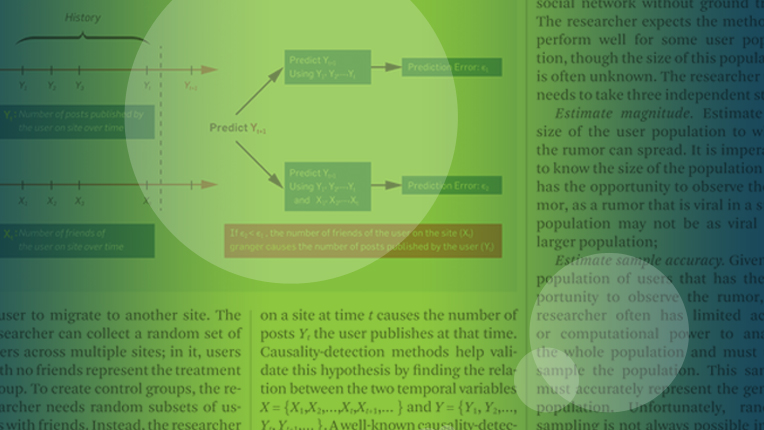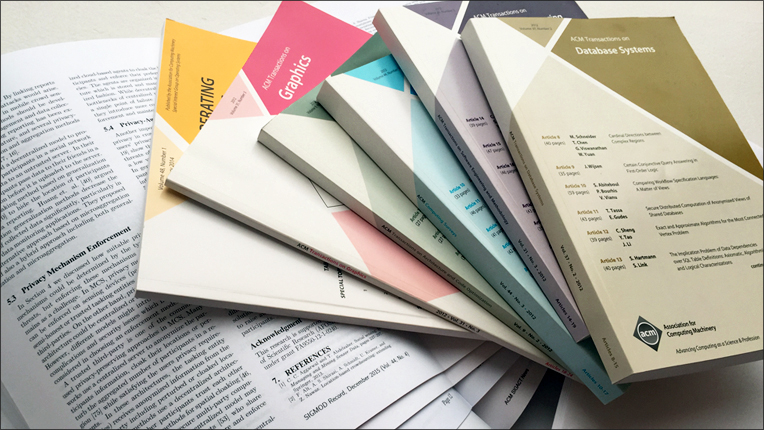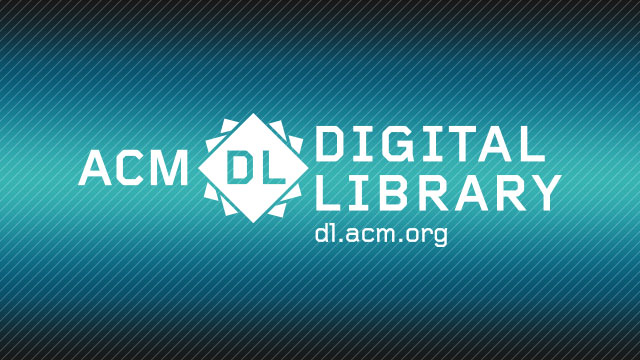Ancillary Authoring Template Information
The ACM Primary Article Template and Publication Workflow package replaces all previous independent class files and packages and provides a single up-to-date LaTeX package with optional calls. The package uses only free TeX packages and fonts included in TeXLive, MikTeX and other popular TeX distributions. The new ACM templates use a new font set (libertine) which will need to be installed on your machine before using the templates. Please download and install the libertine font set before writing your paper. Fonts used in the template cannot be substituted; margin adjustments are not allowed.
The new LaTeX package incorporates updated versions of the following ACM templates:
- ACM Journals: ACM Small, ACM Large, ACM and TOG (also for SIGGRAPH authors publishing in TOG)
-
ACM proceedings templates: ACM Standard and SIGPLAN
NOTE: All ACM journals use the acmsmall template with the following exceptions:
acmlarge - Large single column format, used for DGOV, DLT, DTRAP, HEALTH, IMWUT, JOCCH, TAP
acmtog - Large double column format, used for TOG
NOTE 1: For authors submitting in LaTex to newly launched ACM journals [journal names here]*, please select the “ACM Forthcoming Publication Template” (FACMP). If your paper is accepted for publication, you will need to update your source files with the template created specifically for your journal.
NOTE 2: Most proceedings authors will use the "sigconf" proceedings template. If you are unsure which template variant to use, please request clarification from your event or publication contact.
The new templates enable you to import required indexing concepts for your article from the ACM Computing Classification System (CCS) using an indexing support tool found in the ACM Digital Library (DL) which generates the necessary TeX code once you have selected your terms (and generates XML for Word documents).
It is important to provide the proper indexing information from the ACM Computing Classification System (CCS). Accurate semantic tagging provides a reader with quick content reference; facilitates the DL search for related literature; enables several DL topic functions such as aggregated SIG and journal coverage areas; and helps ACM promote your work in other online resources.
NOTE: CCS Concepts and user-defined keywords are required for all articles over two pages in length, and optional for one- and two-page articles (or abstracts); the ACM Reference Format text is required for all articles over one page in length, and optional for one-page articles (abstracts).
LaTeX Collaborative Authoring Tool on Overleaf Platform
- Overleaf is a collaborative platform: Authors can easily invite colleagues to collaborate on their document.
- Authors can write using 'Rich Text mode' or regular 'Source Mode.' This is useful for cross-disciplinary collaboration in the cases where some authors prefer to write in LaTeX while others might prefer a word processing format.
- The platform automatically compiles the document while an author writes, so the author can see what the finished file will look like in real time.
- The template allows authors to submit manuscripts easily to ACM from within the Overleaf platform.
The ACM LaTeX template on Overleaf platform is available to all ACM authors here
ACM Accessibility Recommendations for Publishing in Color
The most accessible approach would be to ensure that your article is still readable when printed in greyscale. The most notable reasons for this are:
- The most common type of inherited Color Vision Deficiency (CVD) is red-green (in which similar-brightness colors that only differ in their amounts of red or green are often confused), and it affects up to 8% of males and 0.5% of females of Northern European descent.
- The most common type of acquired Color Vision Deficiency (CVD) is blue-yellow (including mild cases for many older adults).
- Most printing is in Black & White.
- Situational impairments (e.g., bright sunlight shining on a mobile screen) tend to reduce the entire color gamut, reducing color discriminability.
NOTE: It is NOT safe to encode information using only variations in color (i.e., only differences in hue and/or saturation), as there is bound to be someone affected!
To ensure that you are using the most accessible colors, ACM recommends that you choose sets of colors to help ensure suitable variations in Black & White using either of the following tools:
- ColourBrewer: http://colorbrewer2.org/
- ACE: The Accessible Colour Evaluator: http://daprlab.com/ace/ for designing WCAG 2.0 compliant palettes.
Technical Support
If you have LaTeX-specific questions please review the User and Implementation Guide first.
ACM is happy to provide authors working with LATEX class and Word files technical help. Please direct your technical query to: [email protected] for both LaTeX and Microsoft Word inquiries.
All email queries will be responded to within 24 hours.
Notice to authors: The 2014-2015 ACM Journals article templates ceased to be supported as of Spring 2017. All ACM authors submitting articles now should use the new template for your next submission.
Special Note About Reference Formats
Reference linking and citation counts are facilitated by use of standard reference formats. Please adhere to the in-text citation style and reference format guidelines that we use for ACM publications. If you do not, your paper may be returned to you for proper formatting.
Note: For BibTeX examples see: http://www.acm.org/publications/authors/bibtex-formatting
Supplemental Online-only Material
Please provide a brief description of your supplementary online-only material (i.e., text and multimedia material) to be published in the Digital Library. A short "readme.txt" file will appear in the DL along with your supplementary material describing its content and whatever requirements there are for using it.
Peer Review System
ACM uses two manuscript tracking systems. The following journals use Aries' Editorial Manager: TEAC, TOCT and TOPC. The submission websites are: http://www.editorialmanager.com/teac/, http://www.editorialmanager.com/toct/ or http://www.editorialmanager.com/topc/
All other ACM journals use ScholarOne's Manuscript Central system to handle their submissions: http://mc.manuscriptcentral.com/acm
Language Services
ACM has partnered with International Science Editing (ISE) to provide language editing services to ACM authors. ISE offers a comprehensive range of services for authors including standard and premium English language editing, as well as illustration and translation services, and also has significant outreach in China. Editing is available for both Word and LaTeX files. As an ACM author, you will receive a generous discount on ISE editing services.To take advantage of this partnership, visit http://acm.internationalscienceediting.com/. (Editing services are at author expense and do not guarantee publication of a manuscript.)
Fair Use Guidance
ACM offers Fair Use Guidelines at http://www.acm.org/publications/guidance-for-authors-on-fair-use.
Post Acceptance
When preparing your files for production using the ACM template, you should insert a rights management and bibstrip text block in your source file. You will receive this text block upon acceptance of your paper and after you have selected your rights via the ACM rights management system. If you have submitted your source files for production before receiving this text from the automated rights system, the ACM production team will insert it for you.
Open Access
There are no fees to submit or to publish an article in an ACM journal. However, there is an article processing charge (APC) to publish a paper as open access (OA), should you choose to do so. Click here for further information about ACM's OA program.
Page last revised on June 30, 2025 by Craig Rodkin
Publish with ACM
ACM's prestigious conferences and journals seek top-quality papers in all areas of computing and IT. It is now easier than ever to find the most appropriate venue for your research and publish with ACM.

Select Application-Oriented Papers
Many papers published in ACM's Journals hold great value to software engineers interested in staying at the top of their field. The papers in this collection were selected for their relevance to practitioners who strive to build the software that will shape the future.

New ACM Journals Accepting Submissions
Proceedings of the ACM on Software Engineering (PACMSE): Submission guidelines here
Proceedings of the ACM on Management of Data (PACMMOD): Submission guidelines here
ACM Transactions on Probabilistic Machine Learning (TOPML): Submit papers here
Proceedings of the ACM on Networking (PACMNET): Submission guidelines here
Games: Research and Practice (GAMES): Submit papers here
Collective Intelligence (COLA): Submit papers here
Journal of Computer and System Sciences (JCSS): Submit papers here
ACM Journal on Autonomous Transportation Systems (JATS): Submit papers here
ACM Journal on Responsible Computing (JRC): Submit papers here
ACM Transactions on Recommender Systems (TORS): Submit papers here
Distributed Ledger Technologies: Research and Practice (DLT): Submit papers here
ACM Transactions on Evolutionary Learning (TELO): Submit papers here
ACM Digital Government: Research and Practice (DGOV): Submit papers here
Bringing You the World’s Computing Literature
The most comprehensive collection of full-text articles and bibliographic records covering computing and information technology includes the complete collection of ACM's publications.

New Options for ACM Authors to Manage Rights and Permissions
Changes expand access to Special Interest Group conference proceedings. ACM offers flexible options that fit computing researchers' individual needs.